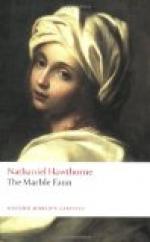“And how could it have come to your knowledge?” continued the sculptor. “But no matter! Do not torture yourself with referring to the subject. Only, if at any time it should be a relief to you, remember that we can speak freely together, for Miriam has herself suggested a confidence between us.”
“Miriam has suggested this!” exclaimed Hilda. “Yes, I remember, now, her advising that the secret should be shared with you. But I have survived the death struggle that it cost me, and need make no further revelations. And Miriam has spoken to you! What manner of woman can she be, who, after sharing in such a deed, can make it a topic of conversation with her friends?”
“Ah, Hilda,” replied Kenyon, “you do not know, for you could never learn it from your own heart, which is all purity and rectitude, what a mixture of good there may be in things evil; and how the greatest criminal, if you look at his conduct from his own point of view, or from any side point, may seem not so unquestionably guilty, after all. So with Miriam; so with Donatello. They are, perhaps, partners in what we must call awful guilt; and yet, I will own to you,—when I think of the original cause, the motives, the feelings, the sudden concurrence of circumstances thrusting them onward, the urgency of the moment, and the sublime unselfishness on either part,—I know not well how to distinguish it from much that the world calls heroism. Might we not render some such verdict as this?—’Worthy of Death, but not unworthy of Love! ’”
“Never!” answered Hilda, looking at the matter through the clear crystal medium of her own integrity. “This thing, as regards its causes, is all a mystery to me, and must remain so. But there is, I believe, only one right and one wrong; and I do not understand, and may God keep me from ever understanding, how two things so totally unlike can be mistaken for one another; nor how two mortal foes, as Right and Wrong surely are, can work together in the same deed. This is my faith; and I should be led astray, if you could persuade me to give it up.”
“Alas for poor human nature, then!” said Kenyon sadly, and yet half smiling at Hilda’s unworldly and impracticable theory. “I always felt you, my dear friend, a terribly severe judge, and have been perplexed to conceive how such tender sympathy could coexist with the remorselessness of a steel blade. You need no mercy, and therefore know not how to show any.”
“That sounds like a bitter gibe,” said Hilda, with the tears springing into her eyes. “But I cannot help it. It does not alter my perception of the truth. If there be any such dreadful mixture of good and evil as you affirm,—and which appears to me almost more shocking than pure evil,—then the good is turned to poison, not the evil to wholesomeness.”
The sculptor seemed disposed to say something more, but yielded to the gentle steadfastness with which Hilda declined to listen. She grew very sad; for a reference to this one dismal topic had set, as it were, a prison door ajar, and allowed a throng of torturing recollections to escape from their dungeons into the pure air and white radiance of her soul. She bade Kenyon a briefer farewell than ordinary, and went homeward to her tower.




